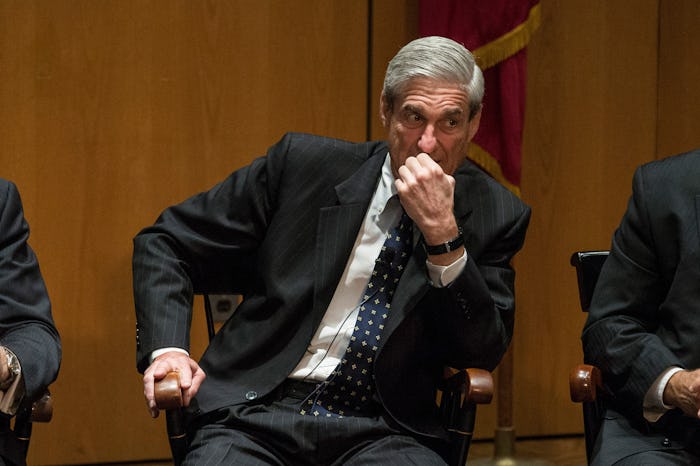News

Could Trump Actually Fire Robert Mueller?
Former FBI Director James Comey may not be the last participant in the Russia investigation to receive President Trump's famous line, "You're fired!" A friend of the president has suggested that Trump is considering firing Robert Mueller, the Department of Justice special counsel. But can Trump fire Robert Mueller? Legal experts say that he can, but it would not be a wise move.
Christopher Ruddy, CEO of the conservative news website Newsmax, and close personal friend and confidant of the president suggested in an interview with PBS Newshour that President Trump may be thinking of dismissing Mueller:
I think he is considering perhaps terminating the special counsel. I think he's weighing that option ... I personally think it would be a significant mistake, even though I don't think there is a justification [for a special counsel].
The White House has since issued statements contradicting Ruddy's comments. In an interview with NPR, Press secretary Sean Spicer stated:
Mr. Ruddy never spoke to the president regarding this issue. With respect to this subject, only the president or his attorneys are authorized to comment.
Despite the press secretary's dismissal of the idea, Ruddy's comments have raised questions about the legality of President Trump potentially firing Mueller.
While Trump would be unable to directly fire Mueller, he could order Department of Justice members to do it for him. In independent investigations such as this one, regulations state that the special counsel can be removed solely by the attorney general. This issue is complicated due to Jeff Sessions having recused himself from the Russia investigation earlier this year.
Without Sessions, the power to remove special counsel would most likely be in the hands of deputy attorney general Rod Rosenstein. President Trump could then order Rosenstein to fire Mueller. If Rosenstein refused to do so, Trump could hypothetically fire him and continue in this manner until a DOJ official followed through with his orders.
Such actions would not be without precedent. If Trump were to decide to fire Mueller, he would be following in the infamous footsteps of President Richard Nixon during the Watergate scandal. According to Politico, in 1973, President Nixon ordered then-Attorney General Elliot Richardson to fire special prosecutor Archibald Cox, who was investigating Watergate. Richardson refused the order and resigned his post. President Nixon went on to order Deputy Attorney General William Ruckelshaus to fire Cox, but Ruckelhaus also refused and resigned. Next in the chain of command was Solicitor General Robert Bork, who eventually followed Nixon’s orders.
Several prominent law professors have commented on the legality of Trump a hypothetically firing Mueller. Paul Rothstein, a law school professor at Georgetown University, has stated that while it would be legal, doing so would have “tremendous political repercussions.”
According to Yale Law Professor Akhil Amar, because the regulations for independent investigations come from the DOJ, they could also be rescinded by it. If this were the case, Trump would no longer have to present the "just cause" currently required to fire special counsel.
Only time will tell if President Trump actually intends to fire Mueller. But one thing is for sure: It would be a long and arduous process that would only further inflate the scandal surrounding the Russia investigation.